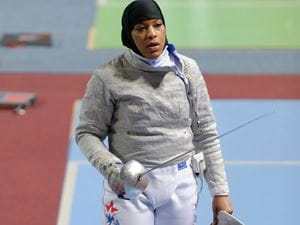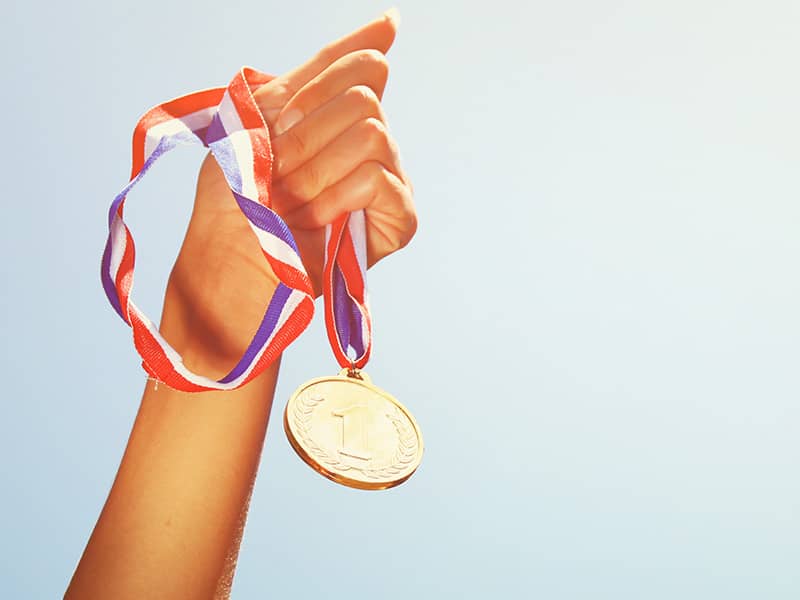
The first oh-my, pinch-me moment for Ibtihaj Muhammad occurred at the opening ceremony. The young woman in the headscarf was standing in the concrete belly of Maracana Stadium when she felt a tap on the shoulder.
"Thank you for all you're doing," Carmelo Anthony told her. "You're changing lives all over the world."
In the cafeteria in the athletes' village, the entire Brazilian basketball team asked the fencer for a photograph. So did the French squad. So have athletes from Tunisia, Iran, Saudi Arabia, England, Egypt and Italy.
Even veterans of multiple Olympic Games have been entranced by Muhammad—who came in second behind Michael Phelps in a vote among U.S. athletes of who should carry the American flag at the opening ceremony. They've pointed at her as she's walked through the village and whispered, Hey, there's the girl in the scarf.
"Ibtihaj can't go more than five feet in the athletes' village without being stopped by someone from another country," said her older brother, Qareeb Muhammad. "She's come to represent something very powerful: that you can overcome challenges and shatter perceptions through sports."
Muhammad, 30, is the first U.S. Olympian to compete while in a hijab, a veil worn by some Muslim women to cover their hair and neck. Monday afternoon, with eight family members sitting in the first and second rows of Carioca Arena 3, Muhammad defeated Olena Kravatska of Ukraine 15-13 to advance to the round of 16 in saber fencing.
An hour later, Muhammad, ranked No. 7 in the world and seeded eighth in this tournament, charged to a 6-2 lead over France's Cecilia Berder, aggressively attacking her opponent and deftly lunging and scoring. But then Berder, ranked No. 12 and seeded ninth, rallied and defeated Muhammad 15-12.
As Muhammad ripped off her helmet, tears welled in her eyes.
"I love my teammates and I believe in them," she said. She'll be competing with them in the saber fencing team event starting Saturday. "I want us to win a medal. More than anything, I want us to do it for our country."
There have been several high-profile American Muslim athletes in the past—Muhammad Ali, Kareem Abdul-Jabbar, Hakeem Olajuwon—but there has never been a star-spangled female Muslim athlete who has fired the imagination of the sporting public quite like Muhammad. Ibti, as her family and friends call her, is the rare fencer whose appeal has crossed over into the mainstream.
Her Q-rating skyrocketed in February after President Barack Obama mentioned her during a speech at his first visit to a U.S. mosque. "I told her to bring home the gold," Obama said, locking his eyes on Muhammad, "not to put any pressure on you." She's also rubbed shoulders with the first lady, giving her a fencing lesson using foam foils. All the while she's been outspoken about the challenges of being a Muslim-American.
"I've been followed before and, yes, I have felt unsafe," she said. "And there's a misconception that Muslim women are forced to wear hijab and that we can't be in sports. I'm here to challenge those misconceptions. … I remember being told as a kid that I shouldn't fence because I was black. And it's like, why? I want to fence."
The most famous fencer in the history of the sport grew up the second of five children in Maplewood, New Jersey. At the age of six, Muhammad and her older brother would wander around their backyard in search of sticks. Once their weapons were chosen, they would engage in sword fights. During the winter, they’d have snowball fights that lasted until nightfall.
"Ibtihaj was always very athletic, even when she was a little girl," said her father, Eugene Muhammad, a retired police officer. "We have a swimming pool in our backyard and I taught her to swim, taught her to throw a ball and basically taught her all the sports. I wanted her to be active in sports because they give you structure and discipline in your life."
In junior high, Ibtihaj played volleyball and basketball while wearing her hijab. This made her a target. "Any time you look different as a kid you're going to be harassed," said Qareeb, her brother. "And she was. She got teased a lot."
Then one afternoon when Ibtihaj was 12, her mother, Denise, drove by the local high school. In the distance, she spotted a group of girls decked out head-to-toe in fencing gear, their heads covered in masks, their arms and legs in long jackets and pants. She immediately told her daughter that she needed to try that sport—whatever it was.
In high school, the fact that, once in uniform, she looked just like her teammates put her at ease; no longer did she stick out. "It's hard to feel like you're a part of a team when you look different from everyone else," said Qareeb. "But in fencing everyone is equal in appearance."
Things grew harder for the family after 9/11. Eugene had just finished the night shift when his wife called to tell him that the sky was on fire in southern Manhattan. Looking across the Hudson River at the smoldering ruins of the twin towers, Eugene sensed that the lives of his children would never be the same in America.
"Ignore the bad comments," Eugene told Ibtihaj. "People are going to be biased, but you have to remember that the majority of people are good and have kindness in their hearts."
Muhammad earned a fencing scholarship to Duke, where she became a three-time All-American and in 2007 earned degrees in international relations and African and African-American studies. After narrowly failing to qualify for the Olympics in 2012, she went on a training tear.
Most mornings she'd be out the door in Maplewood by 7 a.m. for a run. Then she'd work out with a personal trainer for a few hours and then ride a train into Manhattan to practice footwork and technique with her personal coach. She'd end the day by sparring for at least an hour.
"Ibti has got a very rigorous schedule," said her younger sister Faizah, who also fences and is hoping to make the 2020 Olympic team. "This is her dream to be at the Olympics. She's been harassed on the street, and people will joke about being a terrorist to her. We all experience it. But she's showing that Muslim-Americans can achieve anything just like anyone else."
After losing in the round of 16, Ibtihaj met her family on the bottom floor of Carioca Arena 3. During the event, a half-dozen Muslim men and women from around the globe approached Eugene and Denise Muhammad to thank them for raising a trailblazing daughter.
In the arena, father and mother, filled with pride, wrapped their arms around their daughter. Ibtihaj then walked outside into the gray afternoon.
She only took a few steps before a stranger approached and asked her for yet another picture. Happily, she obliged.

